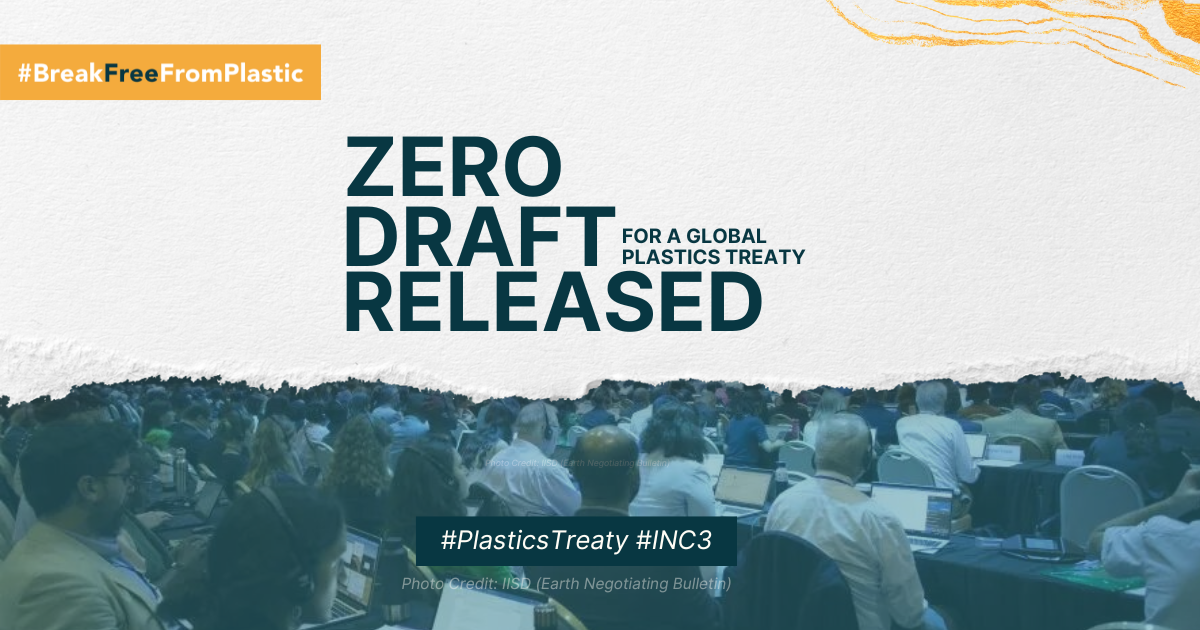Manila – Following the mandate that emerged from the second Intergovernmental Negotiating Committee in Paris for a global agreement to end plastic pollution, today the UN Environment Programme and the Chair of the INC, H.E. Mr. Gustavo Adolfo Meza-Cuadra Velasquez (Perú), released a treaty zero draft to be negotiated at the upcoming INC-3 in November in Nairobi, Kenya.
Since not all matters to be covered in the legal instrument have yet been the subject of detailed submissions and discussion by governments, the draft text includes many placeholders and different language options, which are a good basis for further discussions.
The most promising areas presented in the draft include options for progressive reduction of plastic production, elimination of polymers and chemicals of concern, elimination of problematic short-lived and avoidable plastics, the recognition of the need for transparency, just transition, and the setting up of systems and targets for reduction and reuse, among others.
Potentially problematic and ambiguous provisions include text on recycled plastic content, Extended Producer Responsibility, and waste management. Without ambitious standards, these areas could misplace the emphasis on recycling and waste management measures, undermining the treaty's effectiveness. A key element that needs to be strengthened is the recognition of Indigenous People’s leadership throughout the different elements, which is currently only mentioned in the context of knowledge sharing and capacity building.
Based on a preliminary analysis, #BreakFreeFromPlastic members react to the Global Plastics Treaty zero draft:
Ana Rocha, Director of the Global Plastics Program, GAIA (Tanzania), said:
“GAIA would like to appreciate Ambassador Mesas-Cuadra and the INC Secretary for providing a draft that includes the full range of views expressed by governments during INC-1 and INC-2. The presence of a range of provisions in the zero draft sets a positive baseline for the upcoming discussions at INC-3, which we hope will be faithful to Resolution 5/14 in emphasizing the full lifecycle approach necessary to truly end plastic pollution. Emphasis on prevention, in line with the waste hierarchy, is the only possible path to ensure that human health and the environment are preserved from the harm of unregulated plastic production.”
Lena Estrada Añokazi, Global Indigenous Peoples Representative of UNEP (Uitoto Indigenous of the Amazon), said:
“Indigenous Peoples bear a disproportionate burden of the impacts of plastic pollution, with their rights undermined at every stage of the plastic lifecycle. The draft zero document must contemplate the framework of rights, sovereignty, and the principle of free self-determination of Indigenous Peoples as one of the principles of the Plastics Treaty. For there to be effective participation of Indigenous Peoples in the Plastics Treaty, indigenous knowledge systems that are pre-existing scientific knowledge must be considered at the same level, not only as an exchange of information but in the recognition that these indigenous knowledge systems have to contribute to the mitigation and prevention of pollution of the entire plastic cycle.”
Rafael Eudes, Zero Waste Alliance Brazil, BFFP Youth Ambassador (Brazil), said:
"With an influential first step by recognizing in the zero draft the consideration of children and youth–the largest world population and one of the rights-holders group of the treaty process–the negotiating parties have now the power to define the treaty’s effectiveness to current and future generations. Is up to them to determine whether we will have a strong treaty, taking into consideration an intergenerational equity approach with respect to human rights, or whether the process will result in a weak text full of loopholes that will allow to perpetuate a compromised future with irreversible damage to human health, our wildlife and our ecosystem."
Yvette Arellano, Executive Director Fenceline Watch (Texas, USA), said:
“The first draft takes a step in the right direction but must work toward forging a globally binding path forward. National plans to protect communities from plastic alone do not go far enough. We look forward to a treaty that builds a solid foundation to protect us from the multigenerational impacts caused by plastic our children will inherit.”
Von Hernandez, #BreakFreeFromPlastic Global Coordinator (Philippines), said:
“The zero draft provides a good basis for the upcoming negotiations at INC-3. But as always, the devil will be in the details, specifically with regard to plastic production reduction targets and the criteria that will need to be agreed upon to reduce and eliminate problematic polymers, plastic products, and chemicals of concern. The work of the negotiating parties is cut out for them. The choices that Member States make and the operative verbiage that they select will be the mirror that gets held up to their ambitions. It is these decisions that will determine if we will be getting a strong effective treaty. We look forward to seeing how the zero draft will aid the negotiations because it is high time that we ensure environmental justice and protect our climate, biodiversity, human health, and human rights from the affliction caused by plastics."
###
Notes to the editor
About BFFP — #BreakFreeFromPlastic is a global movement envisioning a future free from plastic pollution. Since its launch in 2016, more than 2,700 organizations and 11,000 individual supporters worldwide have joined the movement to demand massive reductions in single-use plastics and push for lasting solutions to the plastic pollution crisis. BFFP member organizations and individuals share the values of environmental protection and social justice and work together through a holistic approach to bring about systemic change. This means tackling plastic pollution across the whole plastics value chain – from extraction to disposal – focusing on prevention rather than cure and providing effective solutions. www.breakfreefromplastic.org.




